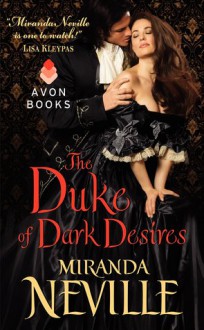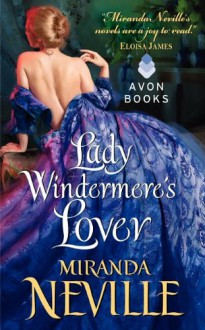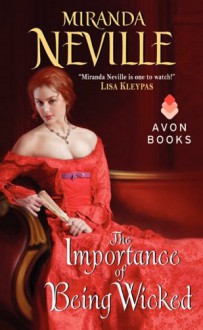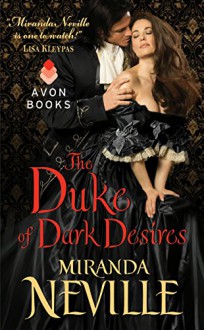
No one ever expected Julian Fortescue to end up becoming a Duke, least of all himself. But after a series of tragic accidents, illnesses and old age kills off most of his male relatives, Julian finds himself as Duke of Denford. As this book begins, he is also actually a wealthy man, having come to a settlement with all of his relatives that means he has the money to support himself in style. This doesn't escape the notice of his dear mother, who promtly arrives on the doorstep of his rather bare and understaffed town house with his three younger half-sisters in tow. Julian never got along with his mother's second husband (who was very religious and liked to beat his step-son), and so has barely had any contact with his mother or younger sisters. Now his mother has married an American sea captain, and emotionally blackmails Julian into accepting guardianship of the three girls.
Julian has absolutely no idea what to do with three young ladies. He's not exactly a great role model to them, with a history of womanising, gambling and drinking. While he may have become a Duke, he's not given up his former trade of art dealing, to the disapproval of much of the ton. He tries to get his neighbour's wife, Lady Windermere, to help him hire a governess, but she just laughs at him. So when the mysterious, but very sensual Miss Jane Grey shows up on his doorstep, wanting the position, and Julian instantly falls in lust with her, he hires her on the spot, figuring that she can tutor the girls by day, and warm his bed by night.
Jane Grey is in England for revenge, however. She is in reality Jeanne-Louise de Falleron, only survivor of the Falleron family, who were arrested and executed during the Revolution. She knows that a man named Fortescue was supposed to help her father obtain the correct papers to allow the family safe passage out of Paris, in return for a share in the family's priceless artworks. Instead the family were betrayed. Jeanne only survived because she had the papers for the family's governess, the actual Jane Grey and one of the soldiers arresting the Fallerons saw an opportunity to get a grateful mistress out of the bargain. Having been Jane for so long, doing whatever she needs to survive, Jeanne is a far cry from the innocent, pampered French girl she once was. Her thoughts of revenge are what has kept her going. She knows that Denford is the head of the Fortescue clan and figures that being in his household will be the best way to tracking down the man who betrayed her family, so she can kill him.
No longer a sheltered society virgin, Jane is used to men's desire and finds Denford as attractive as he does her. Sleeping with him will only complicate things, so Jane refuses to give in to his attempts at seduction, for a period at least. Of course she grows more attached to the girls she teaches with every day, remembering the younger sisters that she lost. She also spends every evening in companionable conversation with Julian in his library, under the guise of reporting on her work with his sisters. As the weeks pass, she no longer wishes to resist him.In her spare time, she tries to investigate the various members of the Fortescue family who may have been in France during the Revolution, and tires to ignore her fears that the man she's falling for, may in fact be the man she has sworn to kill.
The fourth and final book in Miranda Neville's Wild Quartet series is the one I've really been looking forward to, because the hero has been such a fun supporting character in the previous books in the series. Throughout the series, Julian's dark past and clear remorse about something that happened in Paris years ago has been hinted at, and it's been mentioned in more than one book that he is in possession of the Falleron collection. So to those readers, it's no surprise at all that Julian is the Mr. Fortescue that Jane/Jeanne is looking for. Of course, it's not exactly kept secret for new readers for long either.
Julian keeps his black hair long, despite the fashion for short hair in gentlemen. He wears unrelieved black and carries a silver-topped cane. He adores being seen as sinister, a bit cruel and uncompromising, and quite happily tried to steal his former best friend's wife away. Yet he's unable to turn his young sisters away and wants them to have the best care possible. He was young and a bit too naive when he was in France all those years ago, and he knows his carelessness was in part responsible for the Falleron family being arrested. He forced himself to watch the daughters being executed, and has never forgotten his complicity. He's not let it stop him from living his life, however. He plans to bring the Falleron collection from Belgium, where he has kept it safely hidden for years and use it to possibly win the favour of the Prince Regent himself. He's a known rake and because he has always been one of the black sheep of the Fortescue family, he feels no particular responsibility to take care of his many relations or take up the mantle of duty that comes with being a Duke.
Jane was promised to a French Duke before the Revolution and was raised in an aristocratic environment, aware both of the privileges and the duties of the nobility. She's shocked at how lightly Julian seems to take his title and how little he seems affected by the importance of his position. As she gets to know him better, she comes to understand that that coincidence, blind luck and the laws of primogeniture all led to him becoming a Duke and having had to struggle to support himself for most of his life, without much if any support from his many distant relations, he feels no particular fondness for any of them, and doesn't quite see why he has to care for them just because he happens to be the nominal head of the family. It would obviously be inappropriate for a governess to lecture her employer, but Jane nonetheless tries to make Julian see that his position in now one where he cannot entirely act solely as he wishes, and that his actions have weight and consequence in a way they didn't when he was one of many mere Mr. Fortescues.
While the relationship between the Duke of Denford and Miss Jane Grey could have been an uncomfortable one, considering that he is her employer, and has so much power over her. Yet because Julian is pretty up front about his desires and wishes from the start, and Jane is no innocent and frankly acknowledges the sexual attraction between them almost as quickly. Julian is very clear that he doesn't want anyone unwilling in his bed, and while he places Jane in the bedroom next to his, he also makes sure to give her the key to the adjoining door, so she will feel safe (and also because he realises how tempting having the key to his bedroom may be for her). It's quite clear to Julian that Jane is not who she pretends to be, and that there is something in her past she wishes to keep hidden. She claims to have worked as a governess for the governor of St. Lucia, but she speaks French like a pre-Revolutionary aristocrat, and their nightly conversations proves that she is far too knowledgeable in certain areas to be a common-born servant.
Jane fights her attraction because she knows she and Julian have no future. Her mission is to find one of his relatives, murder him and then try to flee to the Colonies, where she will hopefully be safe from prosecution. Even if she wasn't set on revenge on the shadowy Mr. Fortescue, Julian is a Duke and she is a morally compromised nobody, no matter how grand her family once was. Having submitted herself first to the soldier who saved her from the guillotine and later been the mistress of a rich merchant, she no longer has the exclusive pedigree required of a potential Duchess. Julian, used as he is at ignoring social conventions begins to consider Jane a suitable wife long before he discovers her real identity. He clearly has no problems with the idea of marrying his governess/mistress. She's excellent with his sisters and she makes him feel better, in and out of bed.
There is a lot more to this romance that I'm not adequately able to get across. Elyse over on Smart Bitches, Trashy Books does a much better job. It was her enthusiastic reviews of this book and Lady Windermere's Lover that make me pick up this series in the first place. While I wasn't quite as enthusiastic about the other three books, I'm glad I read them to get the background and history required to really enjoy this one. I shall keep a lookout for new books by Miranda Neville in the future.

 Log in with Facebook
Log in with Facebook 









